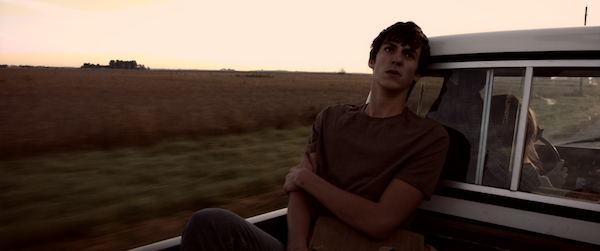A Midwestern family threatens to fall apart in the aftermath of a botched crime. Earnest drama marks feature debut for director T.A. Manchester.

Everyone involved with Things We’ve Seen had obvious good intentions. That might be the best aspect of an otherwise underdeveloped feature.
Told in a detached, elliptical style, the film opens on frightened perpetrators of an unexplained crime as they fight each other over their next steps. Outside police hold back an angry mob. A fire destroys a mill.
One woman watches the fire with a steely expression. She is Ivory Joy (Shani Salyers Stiles), mother of two and estranged from her husband Rayford (Randy Ryan), a musician who left long before the movie starts. Her teenage sons handle his absence in different ways. Reagan (Jarrett Maier) obsesses over his father’s music, while Neely (Noah McCarty-Slaughter) withdraws into mechanics, fixing engines and small appliances.
Local sheriff Pascal (John D. Carver) has already decided that Rayford is to blame for the arson that destroyed the mill. He brings an eviction notice to Ivory Joy, who has no money and nowhere to go. For that matter the Rust Belt town itself is disappearing. With no work, everyone is moving away—not before singling out Ivory Joy for her husband’s crimes.
Reagan uncovers a map that shows Rayford’s hideout. Ignoring Neely’s warnings, he finds not just his father, but Rayford’s badly wounded brother Rick (Jordon Hodges). The rest of the movie tests the moral choices each character faces. Help the police or your family? Punish or forgive those who have hurt you?
Handicapped by a miniscule budget, writer and director T.A. Manchester should be commended for getting a distinctive vision onto the screen. You can agree or not with issues like pacing and performance, Things We’ve Seen reflects what Manchester wanted his film to be.
Unfortunately Manchester’s script is by turns too vague or too blunt. Steven Turco’s camerawork suffers from a similar problem. At times his compositions are dark and unreadable; others place characters into obvious poses that seem artificial.
The performers do their best to inhabit their roles. Ryan feels authentic enough, but Stiles and the younger actors push their emotions too hard. They needed a stronger hand to rein their impulses in.
Intentionally clammy and claustrophobic, The Things We’ve Seen can build an effective mood as its characters struggle with their problems. It also shows that even with a small budget, determined filmmakers can accomplish something worthwhile.
Manchester has screened The Things We’ve Seen at several festivals, where it has won a number of writing and acting awards. Currently it is available on iTunes, GooglePlay and Amazon as well as on DVD and Cable VOD.


